Are you well-versed in the critical concept of medical necessity for dietitians? As a reimbursement coach, I field numerous questions on this important topic. However, I find many dietitians don’t understand what this concept really means regarding insurance. Let’s dive into what medical necessity truly means for dietitians. And identify why it’s crucial in navigating a patient’s benefit and keeping your hard-earned money in your pocket.
Decoding Medical Necessity in Dietetics
Medical necessity is important in determining whether or not a ‘service’ is covered by an insurer. According to the Medical Review Institute of America, medical necessity implies the healthcare services or products a dietitian provides to prevent, diagnose, or treat an illness, injury, disease, or its symptoms are consistent with pre-established standards of care. The definition emphasizes adherence to dietetic standards and clinical appropriateness without prioritizing economic benefits.
Simply, are you treating your patient consistently with evidence-based medical nutrition therapy?
If your documentation was reviewed, would it demonstrate you effectively executed the nutrition care process for this patient?
Key Perspectives on Dietitian-Specific Medical Necessity
The American Medical Association’s definition elaborates on medical necessity, stressing the importance of dietetic treatment aligning with accepted medical practices. This comprehensive definition considers dietetic care’s type, frequency, extent, site, and duration, excluding economic benefits as the primary motive.
In-depth Dietetic Explanation: Another perspective tailored for dietitians states that medical necessity involves dietetic treatment for preventing a significant deterioration in health-related well-being.
This underlines the need for a valid reason for seeing the patient, determined by the dietitian based on generally accepted dietetic standards.
So if I were to review the charting for a particular patient and assess the duration of your visits, the frequency of the visits, and the interventions and follow-up care you documented, would it be consistent with the standards of care for treating this type of disease? Hence demonstrating medical necessity for the visit?
For most dietitians, the answer is almost always YES!

Tailoring Treatment Plans
Contrary to the misconception that other medical providers solely influence medical necessity, dietitians (that’s YOU!) are pivotal in determining the most effective treatment plan based on the patient’s medical condition. While you may consult with your patient’s providers to deliver the best care, ultimately, YOU are responsible (as the nutrition expert) for determining whether or not the care is a medical necessity. It’s totally okay to coordinate care and speak to other providers. But if you you also want to ensure this information is in the patient’s chart. But really, what the insurance company is asking based on what YOU know as a nutrition expert is there is a medical reason for the visit(s).
Demonstrating Nutrition Medical Necessity
Dietitians must clearly demonstrate medical necessity through comprehensive chart notes to circumvent issues during medical audits. While referrals and recent lab values can strengthen your case, the focus should be on showcasing why your services are essential for the patient’s well-being. Failure to do so in an audit may result in reimbursement challenges. However, with that being said, don’t overthink this part. Most RDs I know are awesome at charting! But make sure your notes are detailed (like I need to ask a dietitian twice for this!).
Want the video version of this blog? click here to see me in action 🙂
Need help with medical necessity? I got you, boo!
In my reimbursement coaching program, I help dietitians further unravel medical necessity. My program teaches dietitians the intricacies of handling medical audits, offering expert insights, reviewing documentation, and providing sample notes from dietetic audits. That way, you are never alone and know exactly what your documentation should look like.
References
(1) Medical Review Institute of America. “What is Medically Necessary,” accessed on August 15, 2023, from https://www.mrioa.com/what-is-medically-necessary/#:~:text=The%20American%20Medical%20Association%20defines,accordance%20with%20generally%20accepted%20standards
(2) Wilkinson DJ. “What is ‘medical necessity’?” Clin Ethics. 2023 Sep;18(3):285-286. doi: 10.1177/14777509231190521. Epub 2023 Aug 1. PMID: 37621987; PMCID: PMC10444616.
P.S. If an insurance company has recently audited you, don’t stress. You got this! Second, head to my Master Class, “How to Ace your Insurance Audits.”
